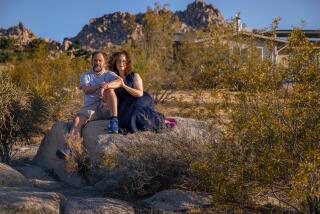The Pain of Going Public
- Share via
Now the world will turn to them again, the parents of slain Wall Street Journal reporter Daniel Pearl. Today, in Pakistan, a verdict is expected in the trial of four Islamic militants accused of kidnapping and killing Pearl earlier this year. Prosecutors have asked for the death penalty.
Since their son disappeared in Karachi on Jan. 23, Judea and Ruth Pearl have tried to avoid the media, and have been declining requests to go before the cameras following the judge’s ruling. Instead, the family is likely to issue a statement.
The Pearls understand and appreciate the interest in their son, the Journal’s South Asia bureau chief. But after leading private lives, they are uneasy under the probing lights of the media. In February, after another news development, reporters who tried to approach the family in the San Fernando Valley found that their two-story, New Orleans French Quarter-style house had sheets of white paper taped over the windows and glass doors.
The Pearls reject the assumption that they must allow the media access to their dark moments. These days, while launching ambitious plans for the Daniel Pearl Foundation, the couple are trying to find their footing in a culture that expects to hear intimate details from grieving parents who have been in the news.
“We want to keep our privacy,” said Ruth Pearl, 66, a retired computer consultant. “We don’t want our pictures in the paper. We want to deal with our grief in private. We don’t want to be talking about it.”
In the past few weeks, though, the two agreed to their first interviews--with Larry King, Oprah Winfrey and a handful of others--to promote an anthology of their son’s writings and a foundation in his name. Now the couple said they will pull back, shutter their hearts once more.
The Pearls are poised and articulate, and have volumes to say about their son and the nonprofit foundation, which will promote peace through music and journalism, and is supported by honorary board members such as Bill Clinton and Elie Wiesel.
But they have been caught off guard by some recent media questions, such as the one asking for comment on the case of missing Salt Lake City teenager Elizabeth Smart, said Judea Pearl, 65, a professor emeritus of computer science at UCLA.
And they are uncomfortable with questions such as “You know the feeling of a child gone ... [Mrs. Pearl], what was it like for you?” (“Larry King Live”). Or, “How does it make you feel now that videotapes of his ... murder are circulating on the Internet, and people are pulling it up and trying to see it?” (“The Oprah Winfrey Show”). (On the graphic videotape distributed by Pearl’s captors, the 38-year-old journalist, under duress, says that he and his parents are Jewish; the footage also shows that he was decapitated.)
After appearing live on King’s show and on the “Today” show in late June, Judea, who heads UCLA’s Cognitive Systems Laboratory, decided that he would not do more TV interviews in the foreseeable future.
Ruth later appeared on Winfrey’s show with Helene Cooper, editor of “At Home in the World,” a collection of Daniel Pearl’s articles from the Wall Street Journal (Wall Street Journal Books/Free Press).
One of the Pearls’ two daughters, 32-year-old Michelle Pearl, said she also hopes to find ways to talk about the foundation without having to answer questions about her brother’s death. “The thing is, when you go on a [TV] appearance, everyone wants to ask, ‘How did you feel during the kidnapping? How did you hear he was dead?’ ”
Added Ruth: “ ‘How do you feel about the video [of your son’s death]?’ And all these questions that are personal and painful. We would like to work on Danny’s legacy and look forward.”
A few days before his abduction, Pearl had called Michelle. His wife, Mariane Pearl, was pregnant with their first child, and he wanted his little sister to be the first person to know that the baby would be a boy. On a recent afternoon, the Pearls showed off pictures of their grandson, Adam, who was born May 28. They plan to visit soon with Adam and his mother, who live in Paris.
In their cozy living room, the Pearls brightened when they talked about their family. Happy reminders of their son’s life are everywhere--his wedding pictures, his beloved music LPs, his new book. They laughed when Michelle, who was visiting for the weekend from the Bay Area, told stories about her brother; the three deferred to and teased one another.
Judea and Ruth always knew exactly where to reach their son, throughout his extensive travels. He called and e-mailed often, to tell his mother about a new kind of bread he had made or the free violin lessons he gave to kids in an underprivileged neighborhood. On visits home, he and his father would play around on the guitar, violin and piano, maybe improvising some marimba-style Vivaldi.
His last visit was in June 2001, when he joined his parents for a trip to Catalina Island. He had planned to join his parents and two sisters Jan. 18 in San Francisco but canceled because of work.
In May, on the outskirts of Karachi, police recovered remains of a body believed to be Pearl’s; DNA tests are pending. Profits from “At Home in the World” will go to the foundation and a trust that was established for his widow and son.
At Ruth’s suggestion, the book includes two funny first-person pieces from her son’s first job with the North Adams Transcript newspaper in Massachusetts. The other stories, all of which were selected by Cooper, are pieces that he wrote in the U.S. and abroad for the Journal.
Pearl found one of the stories when he was sent to Iran in the summer of 1997 to cover elections, Cooper wrote in one of several essays that are woven throughout the book. He returned with a front-page story about how the making of the world’s largest carpet was underway, with “a third of an acre of beige, brown and blue swirls and flowers” and no potential buyers.
The dateline was Ben, Iran. The first paragraph: “This is a small town in search of a really big floor.”
Ruth Pearl said she hopes the book’s readers will get to “know Danny. They heard about him. The grim situation he was in. And now they hear him talking.... His personality comes through. His integrity, his sensitivity, his humor and pain. In one of [the stories], you could see the pain--the [1999] article in Kosovo, where he was seeking to find some ray of hope that there was some friendship holding between the Serbs and Albanians.”
“At Home in the World” has been “very well received by booksellers and the media,” said a spokeswoman for the Wall Street Journal Books/Free Press. The publisher has ordered 70,000 copies, a substantial printing.
Now that word is out, “the book sells itself,” Judea Pearl suggested, and the family can focus on other projects. The foundation, www.danielpearlfoundation.org, “hopes to bring light to the world the way Danny did through his stories and music” and “to address the root causes of this tragedy, in the spirit, style, and principles that shaped Danny’s work and character.”
On June 18, in Washington, D.C., the foundation held its first fund-raiser, a party that drew guests including the Clintons. “I didn’t know what a social event was,” Judea said with a chuckle, “until I met [Bill] Clinton.”
The support has been “very touching,” Ruth said, her voice cracking. “It’s amazing how people knew Danny without meeting him.” Thousands of strangers wrote the family letters; Ruth is trying to write back to every one. “We owe it to the world to keep that image alive and to be contributing to the world,” she said.
Michelle and her 40-year-old sister, Tamara Pearl, who is a homeopath in Canada, cut back their work schedules to devote more time to the foundation. Public relations professionals and others who have donated their time have contributed to the planning.
Ideas include gathering international music artists to record a song that Pearl co-wrote for a friend whose baby was overdue: “Come out, come out, the world is not such a bad place,” he wrote. Michelle rattled off several other projects the foundation might pursue, locally and in other parts of the world, including an East-West journalism conference that could be held in Pakistan.
Judea has another idea on how to reach Pakistanis, those who turn to the radio, instead of TV or newspapers. “The idea is to get some of Danny’s stories translated to Urdu [the language of southern Pakistan] and be broadcast and read on the radio,” he said. “To tell people that American journalists are not to be feared, that there’s some virtue and humanity in them even when they are Jewish, and even when their parents are Israeli.”
His voice was gentle, with no trace of anger or malice.
More to Read
Sign up for Essential California
The most important California stories and recommendations in your inbox every morning.
You may occasionally receive promotional content from the Los Angeles Times.













